We just got back form our midservice conference. That means that we’re officially half done with our Peace Corps service. Wow! The time has flown by. Midservice is a time to reflect on the accomplishments of the first year, and plan for what we’re going to try to bring to fruition in the second. As I was sitting pondering these things, I realized that it might make sense to talk about it here, since I sometimes forget to post about the status of our various projects and efforts. So, here’s the Mid-Service Status Report!
Health Charlas & Family Health Committees
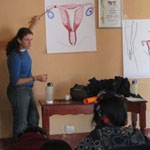 Our main job here is salud preventiva de los hogares rurales, or Rural Home Preventive Health. We give health education to families and women’s groups about basic health practices, relating specifically to their families. It’s a good program. We have two large groups in two different towns that we meet with weekly, and usually between 60 and 80 women show up at one, and that many women plus about a dozen men show up at the other. We tell them about easy stuff like food and water sanitation to prevent parasites and disease, the importance of sanitary latrines, how to maintain a stove to reduce smoke in the kitchen (and related respiratory infections), things like that. We also address tougher taboo topics that local health workers or teachers are not able to touch: AIDS, family planning, alcoholism, risk management during pregnancy. Every time I think we will run out of topics, I realize that we really haven’t even seen the tip of the iceberg of ignorance. But they are enthusiastic and learn quickly, and in our review sessions and evaluations they always demonstrate that they are retaining the material.
Our main job here is salud preventiva de los hogares rurales, or Rural Home Preventive Health. We give health education to families and women’s groups about basic health practices, relating specifically to their families. It’s a good program. We have two large groups in two different towns that we meet with weekly, and usually between 60 and 80 women show up at one, and that many women plus about a dozen men show up at the other. We tell them about easy stuff like food and water sanitation to prevent parasites and disease, the importance of sanitary latrines, how to maintain a stove to reduce smoke in the kitchen (and related respiratory infections), things like that. We also address tougher taboo topics that local health workers or teachers are not able to touch: AIDS, family planning, alcoholism, risk management during pregnancy. Every time I think we will run out of topics, I realize that we really haven’t even seen the tip of the iceberg of ignorance. But they are enthusiastic and learn quickly, and in our review sessions and evaluations they always demonstrate that they are retaining the material.
The bigger issue, however, is do they actually adopt lifestyle changes? It’s hard to barge into someone’s home and see if they are now boiling their drinking water or still pooping in the field, so most evidence is deductive. But it looks like most families aren’t adopting many of the changes, so far. This is a little discouraging, but the truth of it is that it’s really hard to change habits, here or anywhere. We just have to keep teaching, and little by little, ideas will start to sink in.
Midwife Training and Equipment
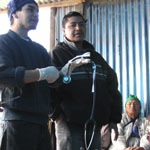 As part of our primary project, we help the health center give ongoing training to midwives. Our municipality has the highest rate of maternal mortality in all of Guatemala, and that’s saying something. But, what do you do when 98% of the births happen in a mud house in the countryside, with a dirt floor, attended by a midwife who has at best a 3rd grade education and can’t even read? It’s a complicated problem, but one that our local health staff is committed to bettering. We are working cooperatively with the Ministry of Health to give monthly midwife training seminars, as well as home hygiene lectures. In addition, we’re continuing our search for agencies or individuals that are interested in helping us get reusable, quality, designed-specifically-for-these-conditions birthing toolkits to our midwives. (click here to download the flyer). We’ve had some success in this area, and are negotiating with an American sponsor (who will remain nameless until details are firmed up) to help raise the $3,000 needed to help our 130 midwives get the tools and training they need to help the women in our area survive childbirth.
As part of our primary project, we help the health center give ongoing training to midwives. Our municipality has the highest rate of maternal mortality in all of Guatemala, and that’s saying something. But, what do you do when 98% of the births happen in a mud house in the countryside, with a dirt floor, attended by a midwife who has at best a 3rd grade education and can’t even read? It’s a complicated problem, but one that our local health staff is committed to bettering. We are working cooperatively with the Ministry of Health to give monthly midwife training seminars, as well as home hygiene lectures. In addition, we’re continuing our search for agencies or individuals that are interested in helping us get reusable, quality, designed-specifically-for-these-conditions birthing toolkits to our midwives. (click here to download the flyer). We’ve had some success in this area, and are negotiating with an American sponsor (who will remain nameless until details are firmed up) to help raise the $3,000 needed to help our 130 midwives get the tools and training they need to help the women in our area survive childbirth.
TemuxMayanArtisans artists’ cooperative
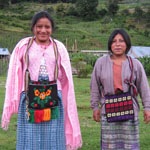 This is Emily’s baby, and I think it has the potential to have more long-term impact than any of the other projects. The economy is terrible here, and many families don’t have the money to properly feed their children or build critical health-saving infrastructure like sanitary latrines or smokeless stoves. What to do? Well, they DO have a strong tradition of skilled craftwork, and lots of extra time. Emily conceived of the idea of Temux Mayan Artisans, a women’s co-op to make and sell morrales (Mayan decorative handbags) to the overseas market, to bring in much-needed income. The Co-op is run by the women, decisions are made by consensus, and all profits go directly to the women themselves. We’re just starting, and have only sold a few bags, but we’ve got a website, an internet store, and several interested marketers in the US. In the coming year, we hope to better refine the co-ops decision making process, find a high-qualiy source of string, and teach the women basic business skills, accounting, and organization. It’s a tall order, but could change everything here.
This is Emily’s baby, and I think it has the potential to have more long-term impact than any of the other projects. The economy is terrible here, and many families don’t have the money to properly feed their children or build critical health-saving infrastructure like sanitary latrines or smokeless stoves. What to do? Well, they DO have a strong tradition of skilled craftwork, and lots of extra time. Emily conceived of the idea of Temux Mayan Artisans, a women’s co-op to make and sell morrales (Mayan decorative handbags) to the overseas market, to bring in much-needed income. The Co-op is run by the women, decisions are made by consensus, and all profits go directly to the women themselves. We’re just starting, and have only sold a few bags, but we’ve got a website, an internet store, and several interested marketers in the US. In the coming year, we hope to better refine the co-ops decision making process, find a high-qualiy source of string, and teach the women basic business skills, accounting, and organization. It’s a tall order, but could change everything here.
Remember Emily Alta, our friend who just left the Peace Corps? Well, she and her father Len are spearheading our marketing efforts back in the US, and have lined up a few fair-trade merchants in Georgia that want to sell TMA products. You can take a girl out of the Peace Corps, but you cant take the Peace Corps out of a girl!
Computer Center
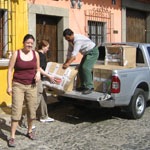
This is the first project we started, and is doing the poorest right now. Our original proposal and agreement with the village elders was that we would all work together to build a computer center for the community: my business contacts would donate the equipment; I would get it to Guatemala, set it up, and train a team of energetic village teenagers on how to maintain it; the health center would lend us a room; the village carpenters would make some tables and chairs; and the village committee would pay the electricity bill. I got the first three taken care of witin the first 6 months, and now the computers have been sitting in a storeroom in the health center for another half year. The elders have been waffling; the electric meter has been “on order” for months, and they tell us the carpenters are not community-minded enough to pitch in. Kids approach me and ask me what happened to the computer center they are so excited about. Next week, Emily and I are going to walk through the valley and visit each carpenter PERSONALLY to try to get this rolling again. It is aggravating that this great resource is sitting idle, where it can’t help anyone. Emily says we should explain to the leaders that if they don’t fill their part of the promise, we will send the computers to a different town that WILL use them. I guess we’ll see what happens. At mid-service we talked about the idea of putting a time limit on projects from the very beginning, i.e. if you don’t do x in y amount of time then the project is off. This is probably a good idea since people who live in the same place doing the same thing most days of their lives don’t appear to be in much of a hurry for anything.
Composting Latrines
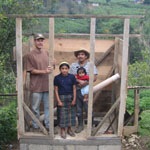
I mark this as my greatest success to date. If you want to read the whole tale, it’s here. We are planning on helping at least two other families build latrines, and I have pledges from sponsors in the US to help fund half the cost. We are spreading word around town that we will help any other family that is willing to meet us halfway by pitching in some materials and sweat. Seeing the latrine that is already built should help encourage that, and convince them that we mean business. If any of you readers in the US want to help sponsor a latrine as well, just email me. I’d love to do more, and the families around here DEFINITELY need help in this area.
Invernaderos (greenhouses)
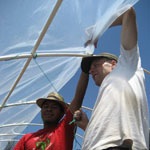
This started as something to do because I was bored, and turned into a surprise hit as well. Emily was craving some fresh vegetables, and told me to plant a garden. It’s cold here, so we decided that a greenhouse would extend the season and make some things (like watermelon) available where they weren’t before. What we discovered is that the neighbors are really interested, helped us set it up, and love to share in the harvest. The greenhouse is easily visible form the center of the village, so it got EVERYONE’S attention, and became a jumping-off point to talk about food security, health, and nutrition. We have been tentatively approached by the school in Pett about helping them set up a greenhouse for the schoolkids to construct and maintain, as a learning project. We might start cooking/ nutrition classes as well. I’ll keep you filled in as new stuff develops.
SPA Sanitary Infrastructure construction
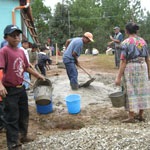 This is one of the cornerstones of our work here, though we’ve only just begun. Grant money from USAID is available to Peace Corps volunteers for sustainable community development projects. Our job is to act as advisors and help the local leaders fill out the paperwork, plan the projects, and execute them. Actually BUILDING the stuff is the easy part; teaching semi-literate country Mayans how to fill out a 20-page US Government application is most of the battle. But i think this work is really important; if they can learn how to do this, then it builds capacity in the leaders, and maybe they can start to “do things themselves” in the future.
This is one of the cornerstones of our work here, though we’ve only just begun. Grant money from USAID is available to Peace Corps volunteers for sustainable community development projects. Our job is to act as advisors and help the local leaders fill out the paperwork, plan the projects, and execute them. Actually BUILDING the stuff is the easy part; teaching semi-literate country Mayans how to fill out a 20-page US Government application is most of the battle. But i think this work is really important; if they can learn how to do this, then it builds capacity in the leaders, and maybe they can start to “do things themselves” in the future.
We have already formed a project committee in our village, as well as in the neighboring village where we give lectures. The committees have decided on a project type, have identified the prioritized families that need the aid the most, and are starting to work on fulfilling the other grant requirements (like filling out the questionnaire, and getting a community bank account). A great amount of work still remains: I have to go survey and measure the houses where we will be building concrete floors, efficient wood stoves, etc. and work up a materials cost proposal. We have to get price quotes, arrange transportation, etc. I feel like it will be a great relief when we can actually start swinging hammers and hoes. And, of course, there’s always the possibliity that we won’t get to, if the town leaders fall into infighting over details, or just lose interest halfway into the application. It’s so hard to know, and I can’t do it for them; that would defeat the purpose of the whole exercise. We’ve made the analogy to parenting several times, and after these experiences, Emily and I find ourselves more and more often saying that “It just might be OK if we never get around to having kids.”
Scholarships for aspiring nurses
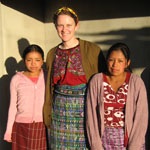 The Friends of Guatemala, a non-profit started by former Peace Corps volunteers, sponsors special scholarships for promising youth. Each Peace Corps volunteer is allowed to nominate one candidate during their service. In one of our health lecture series, our translators are a pair of teenage girls (cousins) who are enthusiastic, helpful, and community-minded. When they came to us looking for financial aid to begin studying to be auxiliary nurses, we realized they were the perfect candidates. A nurse that is FROM our area is such a boon- they already speak the language and have the confidence of the people, and they make good role models for the children in the village. Since Emily and I are a couple, we had the unique oppotunity of being able to propose BOTH candidates for the scholarship.
The Friends of Guatemala, a non-profit started by former Peace Corps volunteers, sponsors special scholarships for promising youth. Each Peace Corps volunteer is allowed to nominate one candidate during their service. In one of our health lecture series, our translators are a pair of teenage girls (cousins) who are enthusiastic, helpful, and community-minded. When they came to us looking for financial aid to begin studying to be auxiliary nurses, we realized they were the perfect candidates. A nurse that is FROM our area is such a boon- they already speak the language and have the confidence of the people, and they make good role models for the children in the village. Since Emily and I are a couple, we had the unique oppotunity of being able to propose BOTH candidates for the scholarship.
However, things did not turn out well. We filled out the applications, communicated with the sponsors, and they won the scholarships. The money was deposited in Emily’s account, and the two girls came by our house to collect it- the day after we found out that neither of them were eligible. One was a year too young to start the program; the other had failed a class in her last year of school and neglected to retake it. Of course, they still wanted the money; and of course, Emily had to refuse to let them have it. It was a big blow to us: all that work, and the end result was that they ruined an opportunity for anyone else in the village to get such a scholarship until our replacements arrive in the fall of 2010.
As you can see, we have varying success in all of these endeavors, and most of this work is still underway. When I look at it all, I quail at the thought of getting it all done in the next 12 months. Realistically, we probably won’t. That’s why there is a 2-year limit in Peace Corps; this work could go on forever if someone didn’t tell you to go home. I guess it’s OK if we don’t get it all done; that way, the next volunteers in our site will have something to start with.